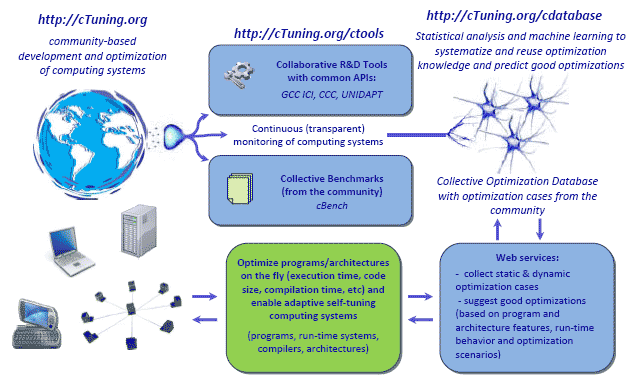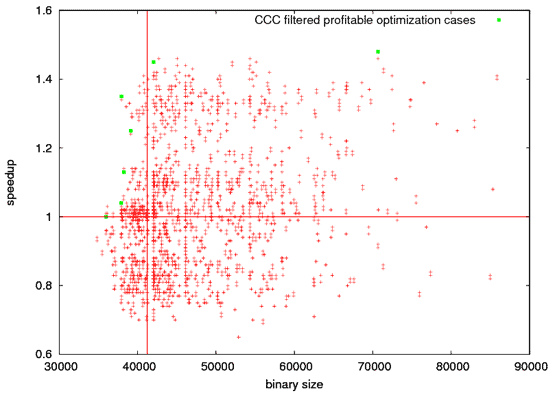From cTuning.org
| Line 27: | Line 27: | ||
{{News1| | {{News1| | ||
| - | *'''2009.August.05''' - The colleagues from the [http://unidapt.org UNIDAPT Group] started investigating the use of [http://ctuning.org cTuning]/[http://www.milepost.eu MILEPOST] technology and the [http://ctuning.org/unidapt UNIDAPT framework] to predict good optimization and parallelization schemes for hybrid heterogeneous CPU/GPU-like architectures together with [http://www.caps-entreprise.com CAPS Entreprise] based on run-time adaptation and profiling, empirical iterative compilation, statistical analysis, machine learning, program and dataset features and run-time decision trees ({{Ref|FT2009}},{{Ref|LCWP2009}},{{Ref|Fur2009}},{{Ref|JGVP2009}},{{Ref|FMTP2008}},{{Ref|LFF2007}},{{Ref|FCOP2005}}). They plan to add new optimization cases to the [http://ctuning.org/cdatabase Collective Optimization Database] in Autumn, 2009. | + | *'''2009.August.05''' - The colleagues from the [http://unidapt.org UNIDAPT Group] started investigating the use of [http://ctuning.org cTuning]/[http://www.milepost.eu MILEPOST] technology and the [http://ctuning.org/unidapt UNIDAPT framework] to predict good optimization and parallelization schemes for hybrid heterogeneous CPU/GPU-like architectures together with [http://www.caps-entreprise.com CAPS Entreprise] based on run-time adaptation and profiling, empirical iterative compilation, statistical analysis, machine learning, program and dataset features and run-time decision trees ({{Ref|FT2009}}, {{Ref|LCWP2009}}, {{Ref|Fur2009}}, {{Ref|JGVP2009}}, {{Ref1|TWFP2009}}, {{Ref|FMTP2008}}, {{Ref|LFF2007}}, {{Ref|FCOP2005}}). They plan to add new optimization cases to the [http://ctuning.org/cdatabase Collective Optimization Database] in Autumn, 2009. |
*'''2009.July.27''' - The paper "Portable Compiler Optimization Across Embedded Programs and Microarchitectures using Machine Learning" ({{Ref|DJBP2009}}) has been accepted for the [http://www.microarch.org/micro42 42nd IEEE/ACM International Symposium on Microarchitecture (MICRO)]. The research has been led by the colleagues from the University of Edinburgh - congratulations! | *'''2009.July.27''' - The paper "Portable Compiler Optimization Across Embedded Programs and Microarchitectures using Machine Learning" ({{Ref|DJBP2009}}) has been accepted for the [http://www.microarch.org/micro42 42nd IEEE/ACM International Symposium on Microarchitecture (MICRO)]. The research has been led by the colleagues from the University of Edinburgh - congratulations! | ||
*'''2009.July.22''' - [http://fursin.net/research Grigori Fursin] is a co-organizer of [http://ctuning.org/workshop-smart10 SMART'10] and [http://ctuning.org/workshop-grow10 GROW'10] workshops that will be co-located with [http://www.hipeac.net/conference HiPEAC'10 conference] in Pisa, Italy at the end of January, 2009. You are warmly invited to submit your novel research results and developments to our workshops! At the websites of these workshops you can find all information about topics, PC, deadlines and submission procedures. | *'''2009.July.22''' - [http://fursin.net/research Grigori Fursin] is a co-organizer of [http://ctuning.org/workshop-smart10 SMART'10] and [http://ctuning.org/workshop-grow10 GROW'10] workshops that will be co-located with [http://www.hipeac.net/conference HiPEAC'10 conference] in Pisa, Italy at the end of January, 2009. You are warmly invited to submit your novel research results and developments to our workshops! At the websites of these workshops you can find all information about topics, PC, deadlines and submission procedures. | ||
Revision as of 11:08, 7 August 2009
It may not always be visible to the IT users, but developing and optimizing current and emerging computing systems using available technology is too time consuming and costly. cTuning.org is a community-driven collaborative wiki-based portal that brings together academia, industry and end-users to develop intelligent collective tuning technology that automates and simplifies compiler, program and architecture design and optimization. This technology minimizes repetitive time consuming tasks and human intervention using collective optimization, run-time adaptation, statistical and machine learning techniques. It can already help to improve performance, power consumption, reliability and other important characteristics of the available computing systems automatically (ranging from supercomputers to embedded systems) and should eventually enable development of the emerging intelligent self-tuning adaptive computing systems.
|
cTuning concept, collaborative R&D tools, cTuning website and optimization prediction services have been originally developed and coordinated by Dr. Grigori Fursin (UNIDAPT Group, INRIA, France) and extended during the MILEPOST project. Since 2009, cTuning.org is a open community-driven project to develop self-tuning computing systems. If you have any questions about cTuning.org, don't hesitate to contact us or use cTuning mailing lists. If you need to reference cTuning project, you can reference cTuning website or the following papers FT2009,Fur2009,FMTP2008. We are very grateful to all our colleagues and users for providing valuable feedback or contributing to the project. You are warmly welcome to join this community-driven collaborative effort to automate code, compiler and architecture design and optimization and boost innovation and research to enable future self-tuning adaptive computing systems based on heterogeneous, reconfigurable multi-core architectures. Note: cTuning is an ongoing evolving project - please be patient and tolerant to the community and help us with this collaborative effort!  Typical non-trivial distribution of optimization points in the 2D space of speedups vs code size of a susan_corners program on AMD Athlon64 3700+ architecture with GCC 4.2.2 during automatic program optimization using ccc-run-glob-flags-rnd-uniform plugin from CCC framework with uniform random combinations of more than 100 global compiler flags (each flag has 50% probability to be selected for a given combination of optimizations). Similar data for other benchmark, datasets and architectures is available in the Collective Optimization Database. cTuning technology helps users find or predict optimial optimization points in such complex spaces using "one-button" approach.  We are participating in the following collaborative activities:
|
|
| cTuning concept: | | cTuning friends: |

| |       
You are welcome to register your interest at this page. |